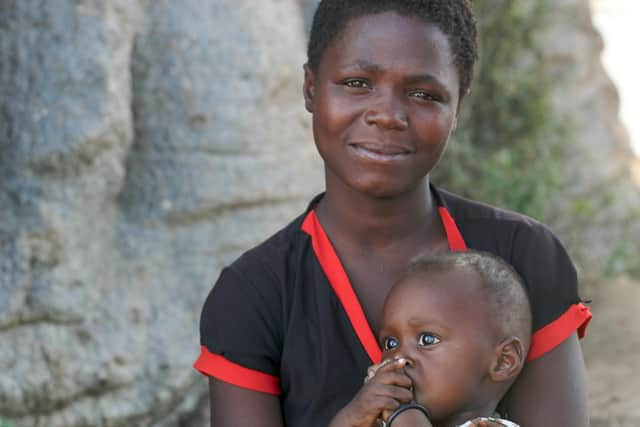Malaria: While you were reading this column, four children died from a single mosquito bite - Susan Dalgety
Every night at 3.00 am without fail, I have a fight with the the flimsy drapes that cover my bed.
Desperate to go to the loo, I must first navigate the net that protects me from one of humanity’s greatest enemies – the mosquito. While in Malawi, where I am just now, my sleep is also interrupted by vivid dreams, some so surreal that they stay with me for the rest of the day – the side effects of the anti-malarial medication I take after dinner and which I will keep taking for a week after I get home. I slather any bare flesh with foul-smelling lotions when I go out in the evening, and just to be on the safe side, as the sun goes down around 5.30 pm, I spray my room with Doom, an insecticide with “deadly killing action”.
Advertisement
Hide AdAdvertisement
Hide AdAnd still, I get bitten. I react quickly, with the bites erupting into a large, red itchy weals which require antihistamine to calm them down. Yet despite being a magnet for mosquitoes, I have not had malaria in the nearly twenty years I have been travelling to this beautiful country. I am lucky. I can afford the best possible preventative measures, like the tablets I take every day. I may stay in budget lodges, but even here, bed nets are part of the furniture, and I think nothing of spending a fiver on a can of Doom. But for the overwhelming majority of the 20 million people who live in this small strip of land that borders a magnificent lake, malaria is part of life, and death.


The biggest victims are children under five. The parasite disproportionately affects them. In sub-Saharan Africa, nearly half a million are killed annually by a single insect bite. There is nothing more harrowing than sitting with a keening mother, mourning the sudden death of her four-year-old daughter, her body still warm, as I did several years ago.
There has been considerable progress made in recent years, thanks in no small part to fantastic work done in Glasgow and Dundee universities, who have both made a major contribution to global efforts to eradicate malaria. There are two new vaccines on trial, one of which is being tested here in Malawi, bed nets have improved and are more widely in use. Mosquitoes love sugar and depend on it for their survival, so simple interventions like sugar traps which lure the insects into a toxic trap are an effective way to keep them under control. But mosquitoes are hardy beasts. And they love climate change.
Changing weather patterns have not only badly affected agriculture in some of the world’s least developed countries, but they have also helped the mosquito expand its range into new areas. And a new mosquito has emerged which breeds all the year round and thrives in urban areas, like Lilongwe, Malawi’s capital. Growing resistance to the most common insecticides and drugs, like the cheap antibiotic Doxycycline which can be used as a preventative measure, is in danger of eroding progress. And the Covid-19 pandemic has weakened already fragile health systems.
As African leaders told the UN a few months ago, urgent action is now required to protect the hard-won gains against malaria. Here in the UK, the Malaria No More organisation campaigns to keep the fight against malaria top of the political agenda. Its leadership council includes tennis star Andy Murray, who says: "It’s unthinkable, yet every day more than 800 children lose their lives because of a mosquito bite. In this day and age, this should not be happening. I truly hope that in years to come we can look back and know that we were the generation that helped to end deaths from malaria."
The fight against malaria requires money of course, which is why Malaria No More focuses on persuading politicians to continue funding research and the delivery of vaccines and other measures. Its latest campaign Zero Malaria Britain urges decision makers to “finish the job”.
At a time of economic uncertainty at home, politicians may be reluctant to invest more in a fight against a disease that only affects people living thousands of miles away. But since Scots missionary and explorer, Dr David Livingstone first realised that quinine, from the bark of the cinchona tree, helped him survive malaria, Britain has led the scientific fight against the disease. And Dundee University’s Africa Initiative, a ten-year programme that brings together scientists and others from Scotland and sub-Saharan Africa, including Malawi, shows how learning from each other and working together is the only way that the world will flourish.
Malaria still kills a child every minute of each day. While you were reading this column, four children died from a single insect bite. The disease destroys African economies. Research shows that it is a major contributor to entrenched poverty, with women and girls the most affected, yet every 10 per cent reduction in the disease is associated with an average rise of 0.3 per cent GDP.
Advertisement
Hide AdAdvertisement
Hide AdThe pandemic showed what the world can do when the richest countries are threatened by a deadly disease. Vaccines were developed in record time. Since my first jab in May 2021, I have had four more Covid-19 vaccinations. Health services were re-fashioned to cope with the crisis and the UK government, however haphazardly, did its utmost to protect the economy and people’s livelihoods. If the same sense of urgency was applied to the fight against malaria, the disease could be, if not eliminated, at least brought under control. All it requires is the political will.
